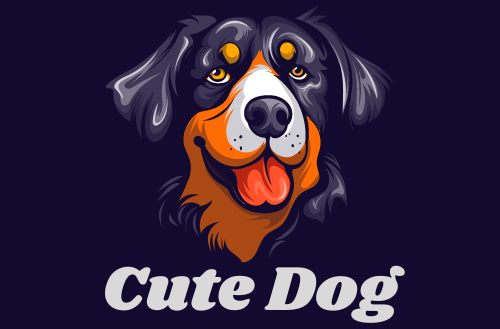Is Your Bichon Frise Puppy Eating Less Than Usual? Concerned about your Bichon Frise puppy’s eating habits? Learn why your furry friend may eat less than usual and when to seek veterinary care.
As a proud Bichon Frise parent, you might have noticed your pup’s appetite has changed. Bichon Frise puppies are full of energy and life. But, their eating habits can sometimes worry you. We’ll look into why your Bichon Frise puppy might be eating less, the health risks, and how to keep them eating well.
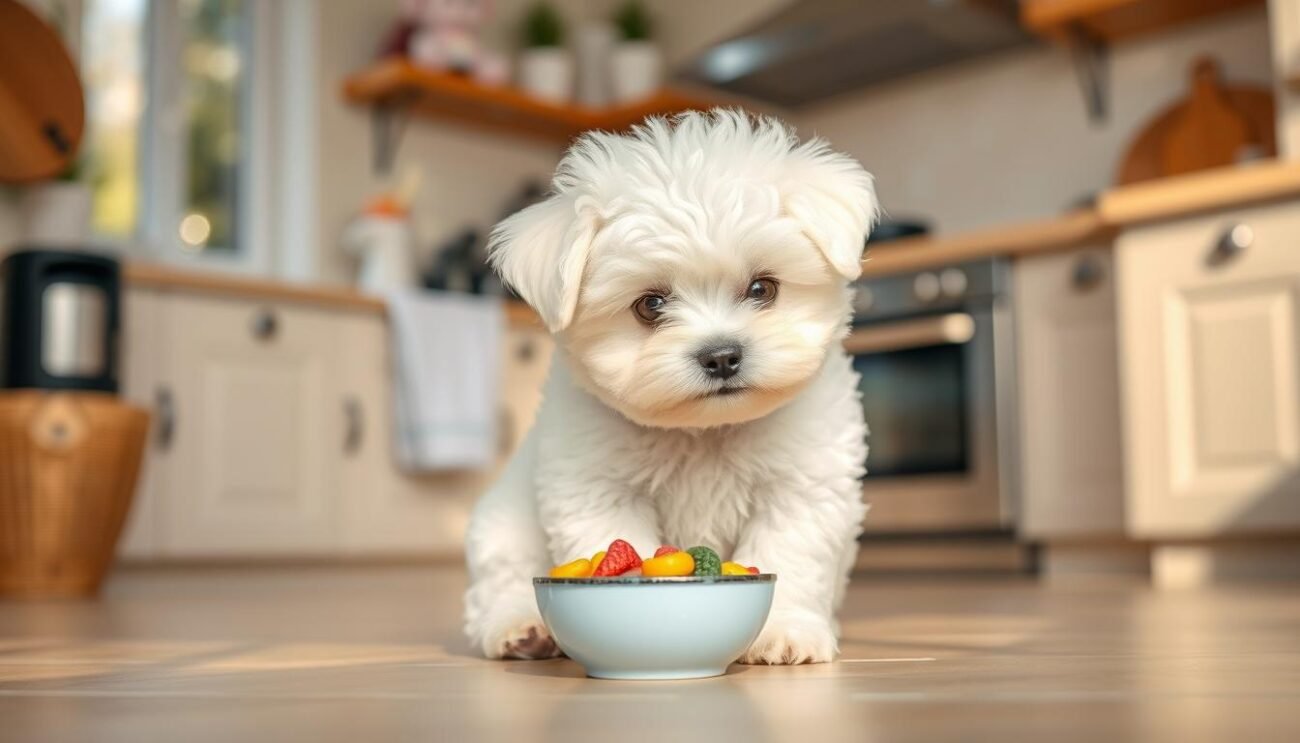
Key Takeaways
- Understand the typical appetite of a Bichon Frise puppy and what may be considered a decreased appetite.
- Identify the common reasons for a Bichon puppy’s decreased appetite, such as health issues, stress, and picky eating.
- Learn how to recognize the signs of a decreased appetite in your Bichon Frise puppy and when to seek veterinary advice.
- Discover effective ways to stimulate your Bichon puppy’s appetite and encourage healthy eating habits.
- Gain insights into age-related changes in your Bichon Frise puppy’s appetite and how to adapt their feeding routines.
Understanding Bichon Frise Puppy Eating Habits
The bichon frise puppy appetite is quite fascinating. Yet, their eating habits can change a lot. This depends on their age, how active they are, and their unique traits. It’s key to know the usual bichon puppy eating habits to spot if they’re eating less.
Exploring the Typical Appetite of a Bichon Frise Puppy
Bichon Frise puppies love to eat. But, their hunger can change as they grow. Young puppies, under 3 months, eat a lot and fast. As they get older, they might want smaller meals more often.
Every Bichon Frise puppy is different. Some eat more eagerly, while others are pickier. Things like stress or changes in their routine can also affect how much they eat.
| Bichon Frise Puppy Age | Typical Appetite |
|---|---|
| 0-3 months | Voracious, consuming meals quickly |
| 3-6 months | More regulated, with a preference for smaller, more frequent meals |
| 6 months and beyond | Consistent and balanced, with individual variations |
Knowing your bichon frise puppy appetite and bichon puppy eating habits can help you notice big changes. These changes might need more attention or a vet visit.
Common Reasons for a Decreased Appetite in Bichon Puppies
As a Bichon Frise puppy owner, you might notice your puppy eating less. This can worry you, but knowing why is key to fixing it. Several things can cause a bichon puppy loss of appetite, bichon frise puppy not eating well, or bichon frise puppy decreased appetite.
Illness is a big reason for a decrease in appetite. Puppies can get sick with things like stomach problems, infections, or dental issues. These can make them not want to eat. Watching your puppy closely and seeing a vet if they act sick is important.
Stress and feeling left out can also make a Bichon puppy not want to eat. Moving to a new home or big changes in their routine can stress them out. This stress can make them lose their appetite.
| Reason | Explanation |
|---|---|
| Illness | Gastrointestinal issues, infections, or dental problems can make puppies less inclined to eat. |
| Stress and Separation Anxiety | Changes in the puppy’s environment or disruptions in their routine can lead to stress and a reduced appetite. |
| Picky Eating Habits | Some Bichon Frise puppies may develop selective eating preferences, making them less interested in their regular food. |
Some Bichon Frise puppies can become picky eaters. This makes them not want to eat their usual food. But, with patience and the right approach, you can help them eat better.
Watching your Bichon puppy’s eating habits closely is crucial. Paying attention to any changes can help you find out why they’re not eating. This way, you can fix the problem and keep your puppy healthy and happy.
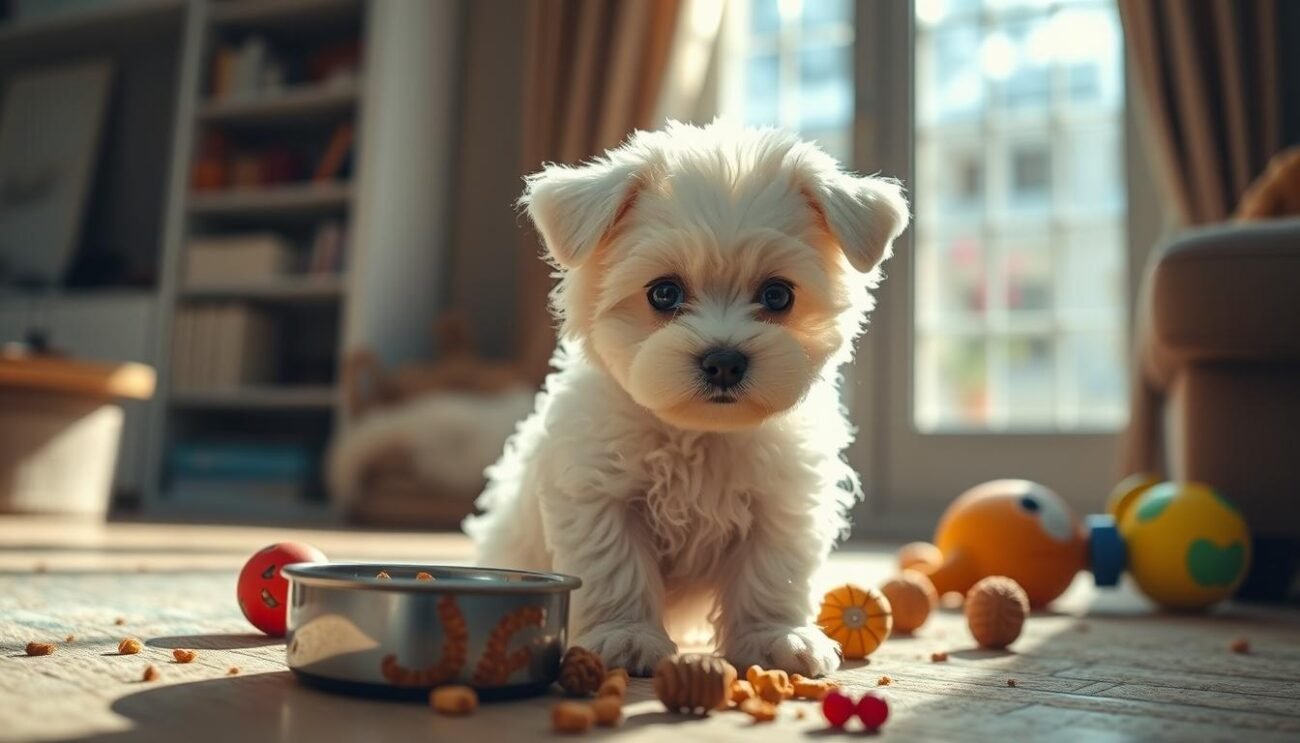
Does Bichon Frise Puppy Eat Less Than Usual?
Figuring out if your bichon frise puppy is eating less can be hard. Their hunger can change from day to day. Knowing what’s normal for a bichon puppy helps spot big changes in their eating.
Bichon frise puppies usually love to eat. But sometimes, they might not want to eat as much. This could be because of teething, growing, or changes in their surroundings.
| Typical Bichon Frise Puppy Food Intake | Decreased Appetite Indicators |
|---|---|
| Puppies 8-12 weeks: 3-4 meals per day Puppies 3-6 months: 2-3 meals per day Puppies 6-12 months: 2 meals per day Approximately 1-2 cups of food per day, divided into meals | Leaving food in the bowl untouched Showing disinterest in favorite treats Sleeping more than usual Decreased energy and playtime |
If your bichon frise puppy is eating less than usual, watch them closely. Big changes in eating might mean they’re not feeling well. It’s best to see a vet if you notice a big drop in their appetite.
Recognizing Signs of Decreased Appetite in Your Bichon Puppy
Watching your Bichon Frise puppy’s eating habits and behavior is important. It helps you spot if they’re not eating as much. Look for signs like how eager they are to eat, how much they eat, and any changes in their mood.
Monitoring Your Puppy’s Food Intake and Behavior
Here are some key signs to watch out for that may indicate your Bichon Frise puppy is not eating well:
- Your puppy seems disinterested in their food, even when it’s their usual mealtime.
- Your puppy is taking longer than usual to finish their meals or is leaving food behind in their bowl.
- Your puppy’s energy levels and playfulness have decreased, which could be a sign of decreased appetite.
- Your puppy is losing weight or their body condition has changed, despite no obvious changes to their diet or activity level.
Seeing these behaviors can tell you if your bichon frise puppy is not eating well or has a decreased appetite. It’s key to watch for any changes in their eating habits and overall health. This is the first step to solving the problem.

“Paying close attention to your Bichon Frise puppy’s eating patterns and behavior can be the key to identifying signs of a decreased appetite early on.”
Bichon Frise Puppy Not Eating Well: Potential Health Concerns
If your bichon frise puppy isn’t eating well, it might be a health issue. It’s important to know why they might not want to eat. This can help you get them the care they need fast.
Dental problems are a common reason for a bichon frise puppy’s loss of appetite. Issues like gum inflammation or tooth pain can make eating hard. Keeping up with dental care is key to their comfort while eating.
Gastrointestinal issues, like digestive problems or food allergies, can also cause a decrease in appetite. If your puppy is vomiting or has diarrhea, they might not want to eat. A vet can help figure out and fix these problems.
Infections, whether in the respiratory system or elsewhere, can also make a puppy less hungry. Symptoms like fever or pain can make eating uncomfortable. Getting medical help quickly is important to treat the infection and boost your puppy’s appetite.
| Potential Health Concern | Symptoms | Recommended Action |
|---|---|---|
| Dental Problems | Gum inflammation, tooth pain | Regular dental check-ups and proper dental hygiene |
| Gastrointestinal Issues | Vomiting, diarrhea, digestive distress | Consult a veterinarian to identify and address underlying GI concerns |
| Infections | Fever, pain, general discomfort | Seek veterinary attention to treat the underlying infection |
If your bichon frise puppy isn’t eating, it’s crucial to get vet help. Working with your vet can find and fix the problem. This ensures your puppy stays healthy and their appetite returns to normal.
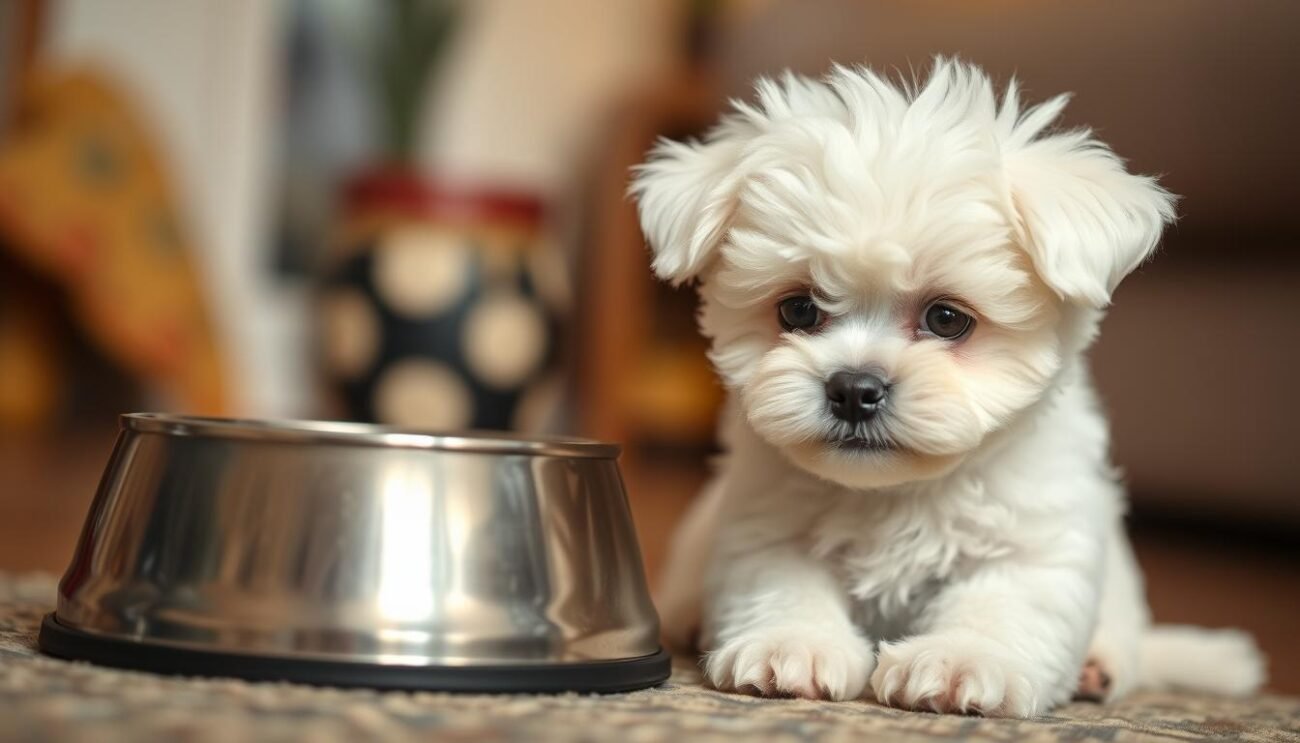
Bichon Puppy Eating Habits: Separation Anxiety and Stress
As a Bichon Frise puppy owner, you might see changes in their eating habits. This can happen due to separation anxiety and stress. These feelings can make them eat less, which is a worry for their health and growth.
Addressing Environmental Factors Affecting Your Puppy’s Appetite
Separation anxiety is common in Bichon Frise puppies. They love their owners and get upset when left alone. This can make them not want to eat as much. Here are some ways to help:
- Start by leaving your puppy alone for short times and then increase it slowly.
- Give them fun toys or puzzle feeders to keep them busy when you’re away.
- Try calming pheromones or supplements to ease their anxiety.
Stress can also make a Bichon Frise puppy not want to eat. Changes like moving or new family members can stress them out. To reduce stress, try these:
- Keep a regular routine to make them feel secure.
- Make sure their space is cozy, quiet, and not too busy.
- Do calming activities like gentle petting or short training sessions.
By tackling these issues and creating a calm, loving environment, you can help your Bichon Frise puppy eat better and feel better overall.

Bichon Frise Puppy Refusing Food: Dealing with Picky Eaters
Getting a Bichon Frise puppy is exciting, but they can be picky eaters. Some may not want to eat certain foods or get bored with their meals. But, there are ways to make eating fun and healthy for them.
Try different flavors and textures in their food. Mix in cooked, lean proteins or fresh veggies. Warming their food a bit can also make it smell better and get them interested.
Keep their eating times the same every day. Don’t let them eat all the time. This helps them know when it’s time to eat and when it’s not.
If they still won’t eat, try feeding them by hand. Use small, tasty treats to make meals more fun. Praise them when they eat well to encourage good eating habits.
Watch their health and weight if they don’t want to eat. Not eating much can mean they’re sick. Always talk to your vet if you’re worried.
Fixing picky eating takes time and creativity. Make meals fun and check their health. This way, your puppy will eat well and stay healthy.
Stimulating Your Bichon Frise Puppy’s Appetite
If your Bichon Frise puppy is eating less, there are ways to help. You can try different techniques to make them excited about food again. These tips are great for picky eaters or those who just aren’t hungry lately.
Tips and Tricks to Encourage Healthy Eating Habits
Change how often you feed your puppy. Smaller meals throughout the day might be more appealing than big ones. Also, mix up the flavors and textures of their food to keep it interesting.
- Try a mix of wet and dry foods for a balanced and tasty meal.
- Warm the food a bit to make it smell better and taste more appealing.
- Give them small amounts of healthy human foods like boiled chicken or plain yogurt as treats.
Make mealtime fun for your puppy. Use interactive toys or puzzles that make them work for their food. This makes eating more exciting and rewarding.
“A fun and engaging mealtime can really help your Bichon Frise puppy stay interested in their bichon frise puppy appetite and bichon frise puppy food intake.”
Keep an eye on your puppy’s eating habits. If they’re not eating, it could be a health issue or something in their environment. Work with your vet to find out why and how to help. With these tips and your vet’s advice, your puppy will be happy and eager to eat.

Bichon Frise Puppy Food Intake: When to Seek Veterinary Advice
As a Bichon Frise puppy owner, you might notice your pet’s appetite drop sometimes. It’s normal for their eating habits to change a bit. But, if their appetite keeps going down, it’s time to see the vet.
Changes in a Bichon Frise puppy’s eating can mean they’re not feeling well. Reasons for this include:
- Gastrointestinal problems, such as digestive upset or food allergies
- Infections or illnesses, like respiratory infections or dental problems
- Stress or anxiety, which can disrupt a puppy’s normal eating patterns
- Picky eating habits or changes in food preferences
If your Bichon Frise puppy isn’t eating well or shows a steady drop in appetite, act fast. Watch how much they eat, drink, and behave. This will help you spot any big changes or trends.
| Symptom | Potential Cause | Recommended Action |
|---|---|---|
| Sudden, severe decrease in appetite | Illness, infection, or other underlying health issue | Seek immediate veterinary attention |
| Gradual, persistent decrease in appetite | Digestive problems, stress, or picky eating | Schedule a veterinary consultation to identify the root cause |
| Refusal to eat certain foods | Food aversion or allergy | Consult your veterinarian to explore alternative food options |
If your Bichon Frise puppy’s appetite drops and they show other bad signs, like vomiting or weight loss, get vet help fast. Your vet can check them out, do tests, and help fix the problem. This will help your puppy feel better and eat right again.

It’s key to keep your Bichon Frise puppy well-fed for their health and happiness. By watching them closely and getting vet advice when needed, you can make sure they stay healthy and happy.
Bichon Puppy Appetite: Age-Related Changes and Adjustments
As your bichon frise puppy grows, their appetite and feeding needs change. Knowing how a puppy’s eating habits change with age helps you adjust their diet. This ensures they get the right food at the right time.
In the early months, bichon frise puppies eat a lot. They need lots of food to grow fast. But as they get older, they eat less.
This decrease in appetite is normal. It shows their energy needs and growth rate are slowing down. By understanding these bichon puppy eating habits, you can give them the right food for their age.
Navigating Appetite Changes
To help your bichon frise puppy with these bichon frise puppy food intake changes, try these tips:
- Watch how much they eat and adjust their meals.
- Switch to food with fewer calories as they get older.
- Feed them smaller meals more often to match their appetite.
- Talk to your vet to make sure they’re getting the right food at each stage.
By paying attention to your bichon frise puppy’s bichon puppy eating habits, you can keep them healthy and happy as they grow.
Ensuring Proper Nutrition for Your Bichon Frise Puppy
Keeping your Bichon Frise puppy’s diet balanced and on schedule is key. High-quality, nutritious food and following feeding guidelines support their growth. Let’s explore how to ensure your puppy gets the right nutrition.
Balanced Diet and Feeding Schedule Recommendations
For your Bichon Frise puppy, a balanced diet is essential. Choose high-quality puppy food made for small breed puppies. It should have the right mix of proteins, fats, carbs, vitamins, and minerals for their fast growth.
Setting a consistent feeding schedule is vital. Puppies need smaller meals often, about 3-4 times a day. This keeps their bichon frise puppy food intake steady and prevents bichon frise puppy not eating well issues.
Always have fresh water available for your puppy. Staying hydrated is crucial for their health and happiness.
“Proper nutrition is the foundation for a healthy and thriving Bichon Frise puppy. Invest time in understanding their dietary needs to ensure they receive the nourishment they require.”
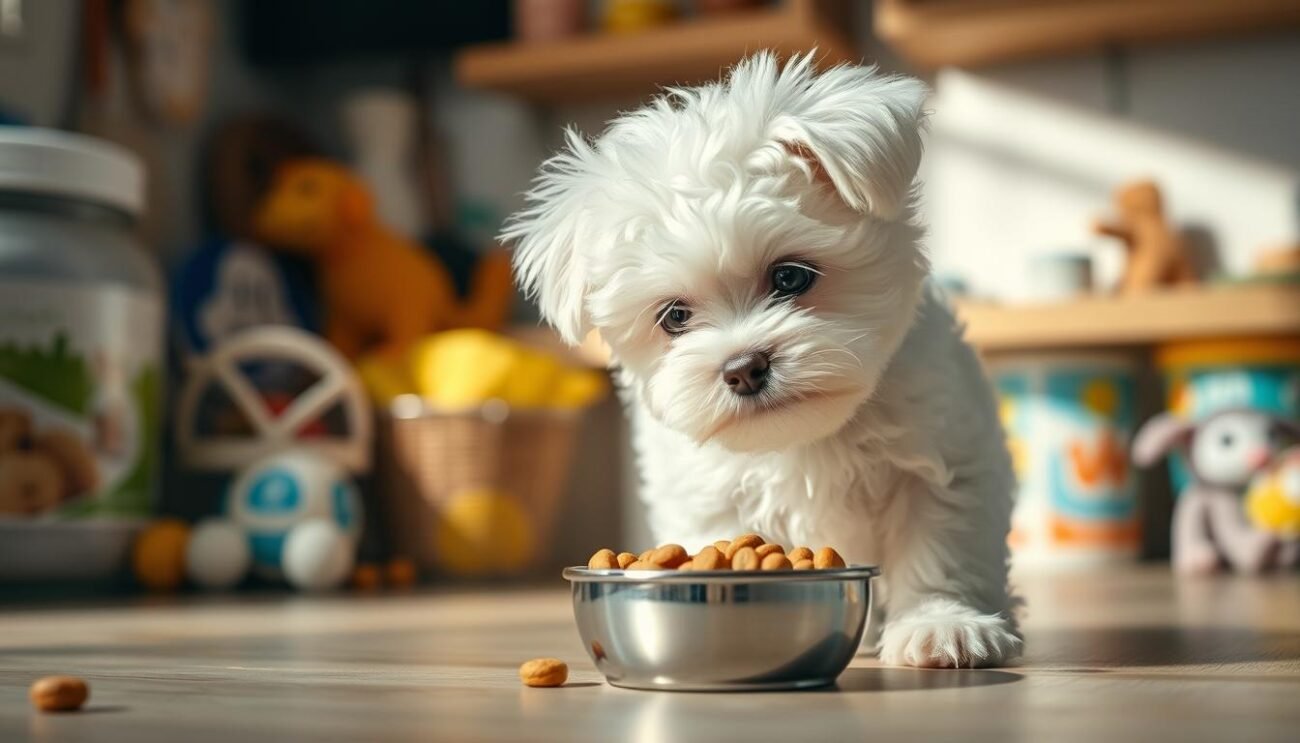
By following these tips, you can ensure your Bichon Frise puppy gets the nutrients they need. This helps them grow into a happy, healthy dog.
Conclusion
Watching how much your Bichon Frise puppy eats is key for their health. Knowing what’s normal and spotting when they eat less is important. This helps them get the food they need to stay healthy.
If your puppy eats less, refuses food, or seems less hungry, pay close attention. There are ways to help them eat more and stay healthy. This includes managing stress and helping them not be picky.
If your puppy’s eating habits change a lot, talk to your vet. They can check for health problems that might be making them eat less. With the right help, your puppy can learn to eat well and stay healthy.
FAQ
Does Bichon Frise puppy eat less than usual?
It’s normal for Bichon Frise puppies to sometimes eat less. Their appetite can change based on their age, how active they are, and their individual traits. If your puppy eats much less than usual, watch them closely and find out why.
What are the common reasons for a decreased appetite in Bichon puppies?
Several things can make a Bichon Frise puppy eat less. Illness, stress, feeling left out, and being picky are common reasons. Finding out what’s causing it is key to fixing the problem.
How can I recognize signs of decreased appetite in my Bichon puppy?
Keep an eye on how your Bichon Frise puppy eats and acts. Look for signs like if they want to eat, how much they eat, and any changes in their mood.
What health concerns can cause a Bichon puppy to not eat well?
If your Bichon Frise puppy isn’t eating, it might be sick. Dental problems, stomach issues, or infections can make them lose their appetite. It’s important to see a vet if this happens.
How can environmental factors like separation anxiety and stress affect a Bichon puppy’s eating habits?
Stress and feeling left out can also affect a Bichon Frise puppy’s appetite. Finding ways to reduce these stressors can help them eat better and feel better overall.
What can I do if my Bichon Frise puppy is refusing food?
Some Bichon Frise puppies can be picky eaters. Making mealtime more fun and appealing can encourage them to eat more.
How can I stimulate my Bichon puppy’s appetite?
If your Bichon Frise puppy is eating less, try different things to get them interested in food. Change their feeding schedule, offer new foods, or use interactive feeding methods.
When should I seek veterinary advice for my Bichon puppy’s food intake?
If your Bichon Frise puppy’s appetite drops a lot, it could be a sign of a serious health problem. Knowing when to get vet help is important for your puppy’s health.
How do Bichon puppy’s appetite and feeding needs change as they grow?
As Bichon Frise puppies grow, their eating habits and needs change. Understanding these changes can help you adjust their diet and address any concerns.
What are the recommended guidelines for proper nutrition and feeding schedule for a Bichon Frise puppy?
A balanced diet and proper feeding schedule are key for your Bichon Frise puppy’s health. Choose high-quality food and follow feeding guidelines to support their growth and well-being.
